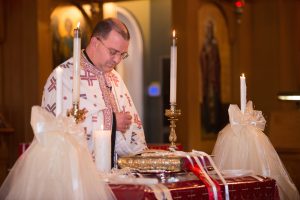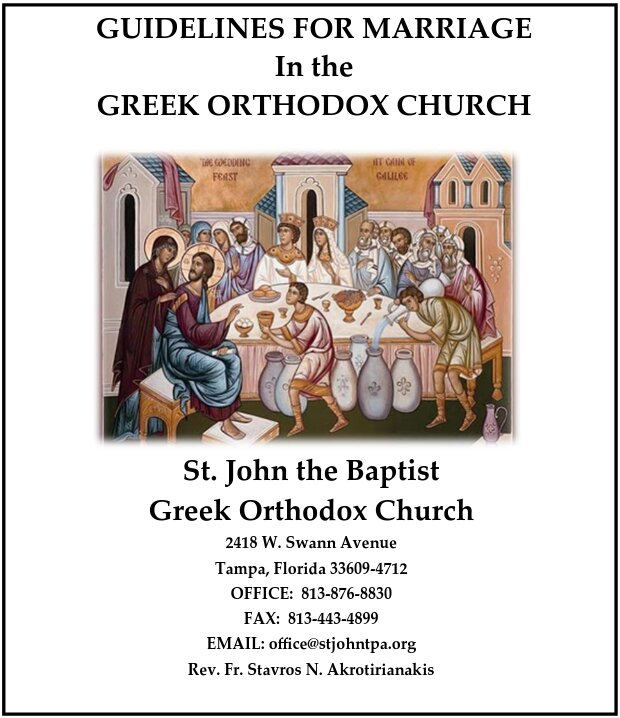
For the union of a man and woman to be recognized as sacramentally valid by the Orthodox Church, the following conditions must be met:
The Sacrament of Matrimony must be celebrated by an Orthodox Priest of a canonical Orthodox jurisdiction, according to the liturgical tradition of the Orthodox Church, in a canonical Orthodox Church, and with the authorization of the Metropolitan.
Before requesting permission from the Metropolitan to perform the marriage, a Priest must verify that: a) Neither of the parties in question are already married to other persons, either in this country or elsewhere (if a person comes to the United States after age 18, they need to provide a letter from their country of origin that they are indeed free to marry); b) the parties in question are not related to each other to a degree that would constitute an impediment; c) if either or both parties are widowed, they have presented the death certificate(s) of the deceased spouse(s); d) if either or both of the parties have been previously married in the Orthodox Church, they have ob- tained an ecclesiastical as well as civil divorce. (The Ecclesiastical Divorce process is done after the civil divorce becomes final, and involves counseling with the parish priest, forms that are filled out, a review by the Metropolitan, a divorce hearing which in the Tampa Bay area is held in Clearwater, and this process usually takes several months to complete. Fr. Stavros will not set a wedding date for anyone until an ecclesiastical divorce has been secured, so please plan accordingly, the ecclesiastical divorce process often takes several months.) e) the party or parties who are members of a parish other than the one in which the marriage is to be performed have provided a certificate declaring them to be members in good standing with that parish for the current year; and f) a civil marriage license has been obtained from civil authorities.

No person may marry more than three times in the church, with permission for a third marriage granted only with extreme oikonomia.
In cases involving the marriage of Orthodox and non – Orthodox Christians, the latter must have been baptized in water, in the Name of the Father and the Son and the Holy Spirit. The Church cannot bless the marriage of an Orthodox Christian to a non-Christian. The couple should be willing to baptize their children in the Orthodox Church and raise and nurture them in accordance with the Orthodox Faith. There is a list with religious groups that Orthodox are prohibited from marrying, i.e. Mormons, Jehovah Witnesses, and others. Fr. Stavros can provide you with this list. This is IMPORTANT to consider when you begin to date someone. Make sure your children are aware of this! Because circumstances exist where a couple is dating where one of the two is not eligible to be married in the Orthodox Church, and this causes heartache in the relationship and often leads to someone leaving the church.

A baptized Orthodox Christian whose wedding has not been blessed by the Orthodox Church is no longer in good standing with the Church, and may not receive the Sacraments of the Church, including Holy Communion, or become a sponsor of an Orthodox Marriage, Baptism, or Chrismation. A non- Orthodox Christian who marries an Orthodox Christian does not thereby become a member of the Orthodox Church, and may not receive the Sacraments, including Holy Communion, serve on the Parish Council or vote in parish assemblies or elections. To participate in the Church’s life, one must be received into the Church by the Sacrament of Baptism, or in the case of persons baptized with water in the Holy Trinity, following a period of instruction, by Chrismation.
Canonical and theological reasons preclude the Orthodox Church from performing the Sacrament of Marriage for couples where one partner is Orthodox and the other partner is a non-Christian. As such, Orthodox Christians choosing to en- ter such marriages fall out of good standing with their Church and are unable to actively participate in the sacramental life of the church. While this stance may seem confusing and rigid, it is guided by the Orthodox Church’s love and concern for its member’s religious and spiritual well-being.
The Sponsor (koumbaros or koumbara) must provide a current certificate of membership proving him or her to be an Orthodox Christian in good standing with the church. A person who does not belong to a parish, or who belongs to a parish under the jurisdiction of a bishop who is not in communion with the Greek Orthodox Archdiocese, or who, if married, has not had his or her marriage blessed by the Orthodox Church, or, if divorced, has not received an ecclesiastical divorce, cannot be a sponsor. Non-Orthodox persons may be members of the wedding party, but may not exchange the rings or crowns.
Please click on the following for more information:

